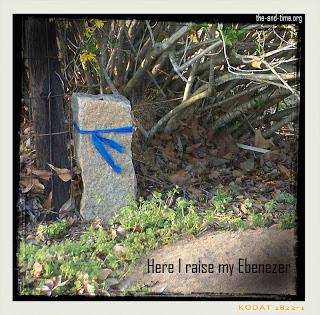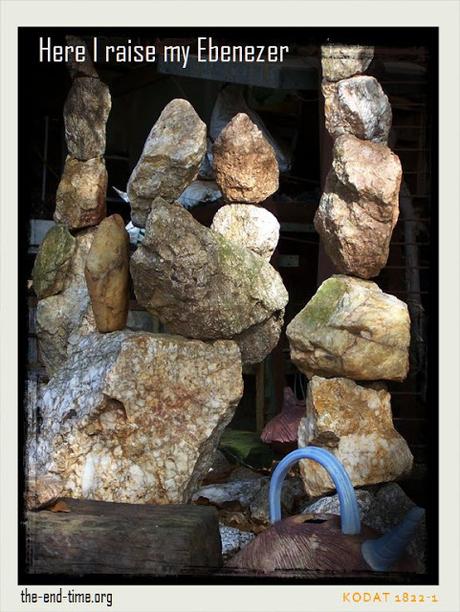 Come, Thou Fount of every blessing,
Come, Thou Fount of every blessing,Tune my heart to sing Thy grace;
Streams of mercy, never ceasing,
Call for songs of loudest praise.
Teach me some melodious sonnet,
Sung by flaming tongues above.
Praise the mount, I’m fixed upon it,
Mount of Thy redeeming love.
Sorrowing I shall be in spirit,
Till released from flesh and sin,
Yet from what I do inherit,
Here Thy praises I'll begin;
Here I raise my Ebenezer;
Here by Thy great help I’ve come;
And I hope, by Thy good pleasure,
Safely to arrive at home.
What is an Ebenezer? Our church had put an explanation in a box at the bottom of the bulletin, which was helpful. We should know what we are singing. Words matter. When we sing in church, or pray, or listen to the sermon, we are meeting with God, eating at His table. We should know what we are about and be mindful of the things we say or do or read or sing.
The phrase comes from 1 Samuel 7:12. Here's the verse:
Then Samuel took a stone and set it up between Mizpah and Shen and called its name Ebenezer; for he said, "Till now the Lord has helped us."
In the first narrative (1 Samuel 4:1-11 ), the Philistines defeat the Israelites, even though the Israelites brought the Ark of the Covenant onto the battlefield in hope of it bringing them a divinely assured victory. As a result of the Philistine victory and the Ark's presence on the battlefield, it was captured by the Philistines, and not returned until many months later (1 Samuel 6:1-2).
In the second narrative (1 Samuel 7:2-14 ), the Israelites defeat the Philistines, after Samuel has offered a sacrifice. Samuel puts up a stone in memorial and names it Eben-Ezer (the placename in the previous narrative resulting from this). This monument is referred to in the hymn Come Thou Fount of Every Blessing. (Source)The Lexham Bible Dictionary also explains-
EBENEZER
"The stone of help" that Samuel set up to commemorate a great victory over the Philistines (1 Sam 7:12). Also the name of the place where the Philistines defeated Israel and captured the ark of the covenant (1 Sam 4:1; 5:1).
Ebenezer as a Place Name
First Samuel 4 describes a battle between the Philistines and Israel, whose army was camped at a place called Ebenezer (1 Sam 4:1). The battle ends in disaster for the Israelites, as the Philistines defeat the Israelite army, kill many men, and capture the ark of the covenant.
Ebenezer as a Monument
Scripture also refers to Ebenezer as the monument stone that Samuel set up after a successful battle against the Philistines. Several months after Israel’s defeat at Ebenezer, Samuel called for the people of Israel to gather at Mizpah and repent of their sins (1 Sam 7:2–14). The Philistines again massed their armies to attack; but as Samuel was praying, God threw the Philistines into a panic. The Israelites cut down the Philistines as they fled, chasing them "as far as below Beth-car" (1 Sam 7:11). In commemoration of the victory, Samuel erected a stone "between Mizpah and Shen and called its name Ebenezer; for he said, 'Till now the Lord has helped us'" (1 Sam 7:12 NRSV).

Raise your own Ebenezer in thanks to the Lord for His help. Our victories are not ours, but His. God is our refuge and strength, a very present help in trouble. (Psalm 46:1).
So that we may boldly say, The Lord is my helper, and I will not fear what man shall do unto me. (Hebrews 13:6 KJV).
